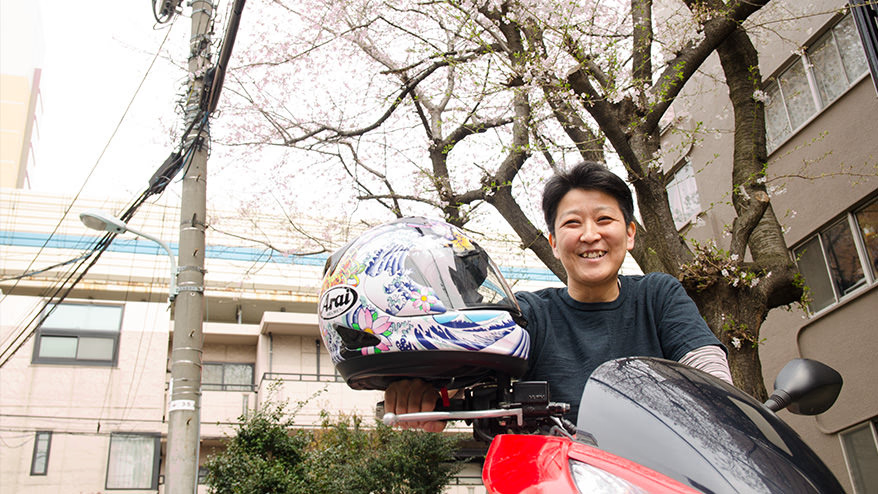ある時は個性豊かなコーダーたちを束ねるリーダーとして、ある時はいちコーダーとして、またある時は1,000ページ以上の超大型案件を担当するディレクターとして、日々獅子奮迅の働きをみせるコーディングファクトリー部コーディングチームリーダー・児嶋いずみ。忙しさのあまり会議の予定を失念し慌てる場面もありますが、お客様との約束と、コーダーへの気配りは絶対に忘れません。
よく笑いよく泣きよく飲み、カメラを向けると恥ずかしがる。そんな人間味あふれる児嶋の、リーダーとしての姿をご紹介します。
作ることが好きだから。
ものづくりの「職人の背中」
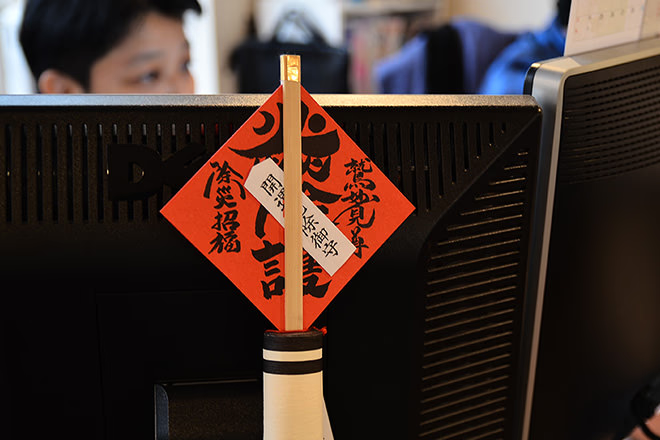
児嶋のデスクに常に置かれている「火消しの御守り」。これまでも炎上案件を抱えたコーダーたちを救ってきた、まさに守り神である
千葉県君津市出身、地元の工業高専にて電子制御を学んだのちに、デザインを志して京都工芸繊維大学に編入。卒業後プロダクトデザイナーなど様々なものづくりに携わってきた児嶋は、フリーランスとしてコーディングファクトリーとともに仕事をはじめたのをきっかけにモノサスに入社。
働き始めたばかりにも関わらず、いきなりモノサス月間MVPを受賞するなどの活躍を見せ、コーディングチームのリーダーに抜擢されました。
現在は、案件スケジューリング、チーム予算管理、班体制や各種委員会の設立などの組織づくり・管理運営の業務を行いながら、自身でもディレクター・コーダーとして案件を持ち、さらにコーダーたちそれぞれの案件についての相談に乗ったり、大型案件の往訪打合わせに同行したりと、ここには書ききれないほどのタスクを日々こなしています。
フリーランス時代から「積み重ねてきたスキルや知恵を後進に伝えていきたい」と考えていたという児嶋は、コーダーの教育にも積極的です。クオリティを保ちながら効率的に作業するフロー、工数計算の方法、スケジュールのたて方、健康管理に至るまで、様々なノウハウをコーダーに伝授してきました。
中でも「往訪打合わせについてのまとめ」は、ディレクション力が必要とされながらも、社外打ち合わせの苦手なコーダーにとって大きな助けとなっています。
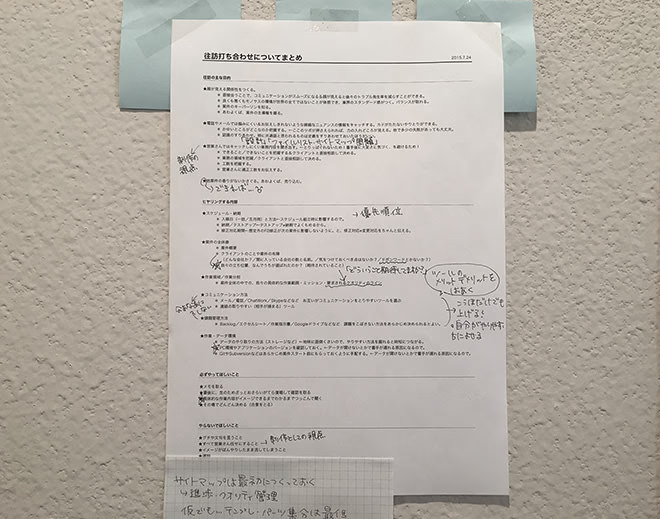
児嶋リーダー謹製「往訪打合わせについてのまとめ」。私もデスク横の壁に常時掲示し、往訪前日にはこれを確認しながらアジェンダを作成しています。
そんな児嶋が昨年度モノサス年間MVPに選ばれた時の言葉。
「案件はどんなものでも大変です。でも大丈夫、作るのが好きだから」
CFではこれまでの制作実績やノウハウを生かし、1,000ページ以上の超大型案件も請け負っています。そういった場合案件ごとにディレクターを立て、チームで制作を進めます。
スケジュールと予算、そしてCFの誇る「絶対に自信のあるクオリティ」を担保するのがディレクターの仕事。これまでの経歴もあり、超大型案件のディレクションは、児嶋が担当する場合が多いのが現状です。それでも、1000Pでも7000Pでも、その中の1Pにすら妥協しないのが彼女。
どんなに難しい仕様でも、逆にシンプルな静的ページでも、何度もお客様に確認をとり、求められるクオリティを常に追求するその姿はまさに「職人」。
直接教えてもらうことだけでなく、その姿勢から我々コーダーが学びとることもまた、数多くあります。
とりあえずビールで!
素直で優しく、常に全力。
児嶋いずみ「個人の背中」
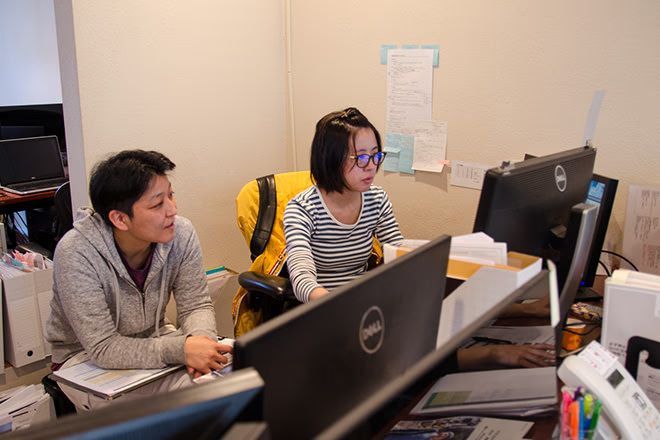
コーダーからの相談を受ける児嶋。「プレーヤーであるコーダーさんをできるだけ支えたい」その思いから、打ち合わせは長時間に及ぶことも。
そんな児嶋、モノサス内では素直な性格で有名で、怒ったり笑ったりはもちろん隠せません。
情に厚く、その涙もろさは部長・伊藤をして「CFの徳光さん」と言わしめるほどです。
ビールに目が無く、たまの休日にはハロー!プロジェクト関連の"ヲタ活"にいそしむ。
仕事が忙しくなってくると、ひとつのことにまっすぐで一生懸命がゆえに、社内会議の予定を忘れて慌てたり、うっかりお昼を食べ損ねたり…。
話に熱が入ってくると、お電話口のお客様に対し、少々フレンドリーな言葉遣いになってしまう時もあります。
また、木更津エリア出身で大型バイク乗りの、ちょっとヤンキーっぽい見た目に反して、かわいらしいものが大好きな児嶋。「ねこあつめ」にハマっていたり、デスクに「児嶋ワールド」を展開したり。
外出先で小さな子供を見かけた時には、眼を細くして、
「まめまめ歩いて、かわいいねぇ」
とひとこと。
まめまめ…。他にも案件スケジュール調整のことを「トントン」と言ったり、データとデータを「がっちゃんこ」したり、独特のかわいい言語センスが光ります。
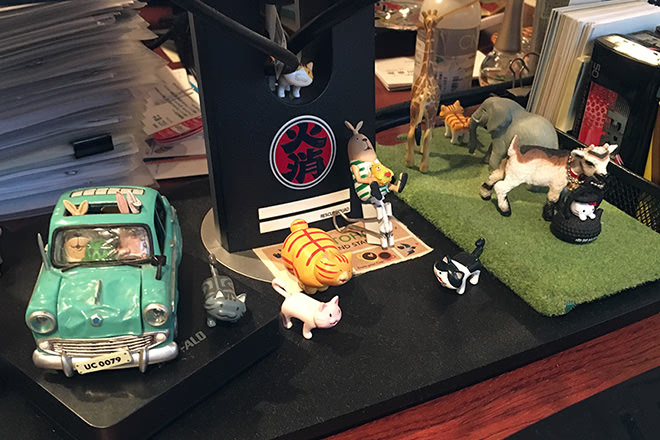
特別仕様の水冷式ハイスペックPCが置かれた児嶋のデスク、そのモニター下には「児嶋ワールド」が広がります。
チームリーダーとして、コーダーからの案件やスケジュールの相談にも応じる児嶋。時折、CFのコーダーたちは「そんなこと言っちゃっていいの?」というぐらい、正直な意見をぶつけることもあります。でもそれは、コーダーの悩みを自分のこととして考え、解決をみるまで何時間でも何日でもとことん付き合ってくれる彼女の人柄ゆえのこと。
そんなコーダーたちにも、児嶋についてどのように思っているのか、アンケートを取ってみました。
「気軽に相談できる珍しい上司だと思います」
「頼りになる人」
「はじめはサバサバした方だなぁと思いました。けれど、本当はそんなことなかった」
「以前朝礼で話されていた、中野で目の見えない人が、雑踏でもぶつかったりせずに歩いているっていう話が印象的でした。そこに目を止めて想像力を働かせられる事に、この人はやさしい人なんだなと感じました」
安心して意見をぶつけあえるのは、信頼しあっているからこそのことなのです。
時には、言葉無くしてコーダーを動かす
「リーダーの背中」
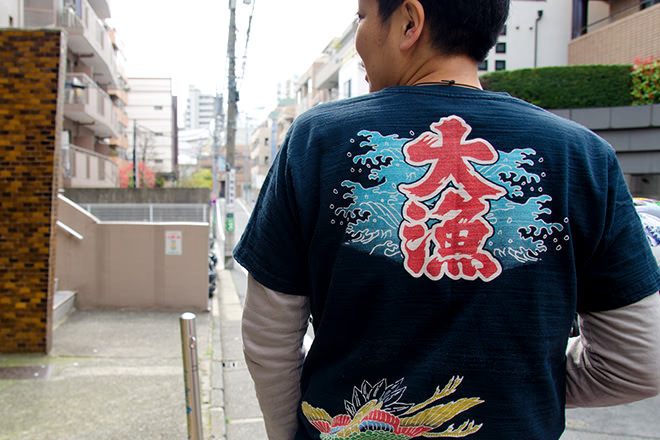
愛用の「大漁」Tシャツには「案件が大漁に来ますように」という気合いが入っています。自分の「背中」については「広いけど、薄いよ!」とのこと。
私が以前働いていた職場の、マネージャー職になるための教科書の中に「リーダーの背中」という言葉がありました。
リーダーの行動は部下に必ず見られている。いくら言葉を尽くしたところで、些細なことでも悪い行動をすれば部下の行動は悪くなり、良い行動をすれば部下はそれを見習う。
リーダーの普段の行いこそ部下が最も見ているものであり、最も重要だ、というものでした。
数か月前のことです。
児嶋は通常の業務に加え、プロジェクトマネージャーとしてとある超大型案件を進めていました。
ページ数も3,000を超え、難易度の高い仕様。UIの提案段階から関わり、お客様同士のパイプ役も担い、社内のチームをまとめ、自分も手を動かし…。
その負担は相当なものでした。
昼夜の区別もなく奔走する児嶋の姿を見て、私はある出来事を思い出していました。
教育係の先輩のもとを離れ、初めての担当案件。そこで私はミスを犯し、あっという間に炎上させてしまいました。
お客様にご迷惑をおかけしてしまった申し訳なさと、自分の不甲斐なさに対するくやしさで頭が真っ白になってしまったとき、他の先輩方とともに手を差し伸べてくれたのが児嶋でした。
「失敗しても死にはしないから、とにかく今はどうすればできるかを考えよう」
何度もそう繰り返しながら、工数とタスクを整理して先輩方に作業を振り分け、私に代わってお客様とやり取りをしてくれたリーダー。
しばらくしてディレクターに転向した私に、いままで培ってきたディレクションのノウハウを叩き込んでくれ、時には夜遅くまで仕事の相談やくだらない雑談にも付き合ってくれた師匠。
自分の失敗談を教訓として聞かせてくれたり、困ったことがあれば、どんな時でも笑顔で納得いくまで話を聞いてくれました。
自分にも、何かできることはないだろうか?やるなら、今しかない!
まずは、自分の案件を自分一人で管理できるようにすること。この時私もある大型案件のディレクションを担当していましたが、お客様とのやり取りなど、いつも児嶋に相談していたこともできるだけ自分で考え進めていくようにしました。また、チームのためにできることはないかと考えた結果、ものさすサイトCFコーナーの取りまとめ役にもなりました。
いつもしてもらっていることに比べれば、とても足りない。そう思いましたが、たとえ微力でも自分のできうる限りのことをしたいと思って行動しました。
そして、私だけではなく、ほかのコーダーたちも、児嶋にかかる負担は最小限になるようにと動いていました。
常に見ていた、児嶋の「チームのために動く姿勢=リーダーの背中」が、チームを動かしたのです。
その案件もようやく終わり、繁忙期も終盤に差し掛かっている今。
今日もCFには「児嶋さーん、相談があるのですが…」と言いながら近づくコーダーと、朝食代わりのバナナをほおばりながら、ちょっとびっくりした顔で「はいっ、どうしたの」と答える児嶋の姿があります。
先にとったアンケートの中にこんな回答がありました。
「コーダーとしての児嶋さんからはまだまだ学びたいことがたくさんあります。
リーダーとしては、CFのコーダーが個性派揃いなので大変苦労されているかと思います。
自分にもできるところがあれば支えていきたいと思っています」
児嶋さん。私たちもあなたを見習ってついていきますので、これからもよろしくお願いします。
